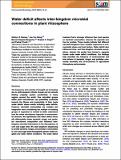Por favor, use este identificador para citar o enlazar a este item:
http://hdl.handle.net/10261/272120COMPARTIR / EXPORTAR:
 SHARE SHARE
 CORE
BASE CORE
BASE
|
|
| Visualizar otros formatos: MARC | Dublin Core | RDF | ORE | MODS | METS | DIDL | DATACITE | |

| Título: | Water deficit affects inter-kingdom microbial connections in plant rhizosphere |
Autor: | Bazany, Kathryn E.; Wang, Jun-Tao; Delgado-Baquerizo, Manuel CSIC ORCID ; Singh, Brajesh K.; Trivedi, Pankaj | Palabras clave: | Root Microbiome Drought Communities Bacterial Biogeography Diversity Responses Cercozoa Reveals Stress |
Fecha de publicación: | 28-may-2022 | Editor: | John Wiley & Sons Society for Applied Microbiology |
Citación: | Environmental Microbiology | Resumen: | The frequency and severity of drought are increasing due to anthropogenic climate change and are already limiting cropping system productivity in many regions around the world. Few microbial groups within plant microbiomes can potentially contribute towards the fitness and productivity of their hosts under abiotic stress events including water deficits. However, microbial communities are complex and integrative work considering the multiple co-existing groups of organisms is needed to better understand how the entire microbiome responds to environmental stresses. We hypothesize that water deficit stress will differentially shape bacterial, fungal, and protistan microbiome composition and influence inter-kingdom microbial interactions in the rhizospheres of corn and sugar beet. We used amplicon sequencing to profile bacterial, fungal, and protistan communities in corn and sugar beet rhizospheres grown under irrigated and water deficit conditions. The water deficit treatment had a stronger influence than host species on bacterial composition, whereas the opposite was true for protists. These results indicate that different microbial kingdoms have variable responses to environmental stress and host factors. Water deficit also influenced intra- and inter-kingdom microbial associations, wherein the protist taxa formed a separate cluster under water deficit conditions. Our findings help elucidate the influence of environmental and host drivers of bacterial, fungal, and protistan community assembly and co-occurrence in agricultural rhizosphere environments. | Descripción: | 13 páginas.- 4 figuras.- 2 tablas.- referencias.- Data Availability Statement The raw sequence data related to this study has been submitted in the NCBI Sequence Read Archive under SRA accessions numbers PRJNA822849 (bacterial 16S rRNA reads), PRJNA822822 (protist 1S rRNA reads) and PRJNA822844 (fungal ITS reads). | Versión del editor: | http://dx.doi.org/10.1111/1462-2920.16031 | URI: | http://hdl.handle.net/10261/272120 | DOI: | 10.1111/1462-2920.16031 | ISSN: | 1462-2912 | E-ISSN: | 1462-2920 |
| Aparece en las colecciones: | (IRNAS) Artículos |
Ficheros en este ítem:
| Fichero | Descripción | Tamaño | Formato | |
|---|---|---|---|---|
| Environmental_Microbiology-2022-Bazany-Water_deficit afects.pdf | 1,54 MB | Adobe PDF |  Visualizar/Abrir |
CORE Recommender
SCOPUSTM
Citations
20
checked on 18-may-2024
WEB OF SCIENCETM
Citations
16
checked on 25-feb-2024
Page view(s)
89
checked on 21-may-2024
Download(s)
176
checked on 21-may-2024
Google ScholarTM
Check
Altmetric
Altmetric
Este item está licenciado bajo una Licencia Creative Commons

